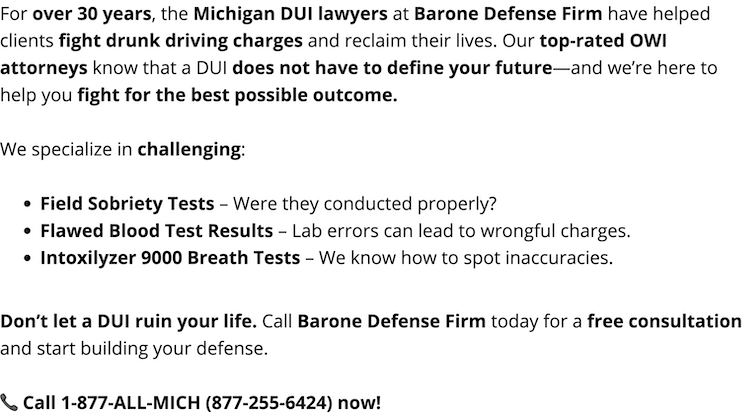Breathalyzer Refusal and Implied Consent
The concept of implied consent is fundamental to Michigan's drunk driving laws. By accepting a driver’s license, you are presumed to have given consent to submit to chemical tests—such as breath, blood, or urine tests—if law enforcement suspects you of driving under the influence (DUI). This consent acts as an exception to the Fourth Amendment's warrant requirement, which generally protects individuals from unreasonable searches and seizures.
Understanding Implied Consent and the Fourth AmendmentHowever, because consent can always be withdrawn, the Implied Consent Law advisements play a critical role. When requesting a chemical test, law enforcement must inform drivers that they have the right to refuse the test. Officers are also required to explain the consequences of withdrawing consent, which include administrative penalties that may affect driving privileges.
Legal Framework and Testing RequirementsUnder Michigan's Vehicle Code Section 257.625c, any person operating a vehicle on public roads is deemed to have consented to chemical testing upon arrest for suspected Operating While Intoxicated (OWI) or similar offenses. This includes tests to determine blood alcohol content (BAC) or the presence of drugs.
Types of Chemical Tests Breath Tests:The most common form of testing, often using the Intoxilyzer 9000. This is typically administered at the police station after an arrest.
Preliminary Breath Tests (PBTs), conducted roadside, are excluded from implied consent requirements. Refusal of a PBT results in a civil fine but no license suspension or points on your driving record.
Blood Tests:Considered more invasive and requiring a warrant unless exigent circumstances exist, blood tests are often used when breath tests are impractical or following accidents.
Urine Tests:Primarily utilized to detect drug use. These are less common but carry the same implied consent implications.
Penalties for Refusing a Chemical TestRefusing to submit to a chemical test requested under the Implied Consent Law triggers serious penalties, independent of the outcome of a DUI charge. Key consequences include:
- License Suspension: Refusal results in a one-year suspension for a first offense and a two-year suspension for subsequent refusals within seven years. No hardship appeal is available for second-time refusals.
- Driving Record Impact: Refusal adds six points to your driving record.
- Administrative Action: Refusal leads to an automatic license suspension, unless contested within 14 days.
- Financial Penalties: Drivers must pay a Driver Responsibility Fee for two consecutive years.
These penalties reflect the state’s commitment to enforcing implied consent laws and discouraging refusal.
The Implied Consent Hearing ProcessDrivers have the right to challenge the administrative penalties for refusal by requesting a hearing with the Michigan Department of State within 14 days of their arrest. This hearing is separate from any criminal proceedings related to DUI charges.
Key Issues Addressed in the HearingAt the hearing, the following factors are examined:
- Whether the officer had reasonable grounds to believe the driver was under the influence.
- Whether the driver was lawfully arrested for an offense requiring chemical testing.
- Whether the officer provided the required implied consent advisements, informing the driver of their right to refuse and the consequences of refusal.
- Whether the driver’s refusal was voluntary and intentional.
If the hearing officer finds in favor of the driver, the suspension may be overturned. Otherwise, the penalties take full effect.
Implications of the Birchfield v. North Dakota DecisionThe U.S. Supreme Court’s ruling in Birchfield v. North Dakota, 579 U.S. ___ (2016), directly impacts how implied consent laws are enforced. The Court held that while warrantless breath tests are permissible as a search incident to arrest, warrantless blood tests are not, due to their invasive nature.
This decision reinforces the principle that drivers can withdraw implied consent, especially for blood tests, without facing criminal penalties, unless a warrant is obtained. In Michigan, this means that officers must secure a warrant for blood tests unless exigent circumstances justify otherwise. Failing to do so could violate a driver’s Fourth Amendment rights.
Paper License – DI 93 vs. DI 177If you take the test and return a BAC result of .08% or higher, your driver's license will be confiscated and destroyed, and in its place you will receive a DI-177 form. The DI-177 and DI-93 forms serve different purposes in Michigan's Implied Consent Law. The DI-177 is issued when a driver submits to a chemical test and records a BAC of 0.08% or higher, acting as a temporary "paper license" while detailing the test results and arrest information. In contrast, the DI-93 is issued when a driver refuses a chemical test, documenting the refusal and initiating penalties such as license suspension, six points on the driver’s record, and the right to request an Implied Consent Hearing within 14 days. Unlike the DI-177, which is tied to the outcome of a criminal OWI case, the DI-93 triggers independent administrative action by the Secretary of State, emphasizing the serious consequences of test refusal.
Building a Defense Against Refusal PenaltiesDefending against implied consent violations and associated DUI charges requires careful legal analysis. Some potential defenses include:
Questioning the legality of the traffic stop or arrest.Arguing that the officer failed to provide clear advisements about the consequences of refusal.
Demonstrating that the refusal was not knowingly or voluntarily made, such as in cases of confusion or coercion.
A skilled attorney can also challenge the validity of testing methods, the calibration of devices like the Intoxilyzer 9000, or procedural errors that may invalidate the results.
Protecting Your Rights with Experienced Legal SupportMichigan’s Implied Consent Law is complex, and its penalties can have far-reaching consequences on your life. From potential license suspension to difficulties with insurance premiums and employment opportunities, the impact can be significant. However, these consequences are not inevitable.
At Michigan Defense Law, we understand the intricacies of implied consent violations and DUI cases. Our team works tirelessly to challenge unjust charges, advocate for your rights, and help minimize penalties. Whether you're facing a refusal hearing, administrative penalties, or criminal charges, we provide comprehensive legal support tailored to your unique circumstances.
Criminal OWI Case vs. Implied Consent HearingMichigan drivers facing an Operating While Intoxicated (OWI) charge may find themselves navigating two separate legal processes: the criminal OWI case and the implied consent hearing. These proceedings are independent of each other, and their outcomes are not directly related.
When you refuse a chemical test, the Secretary of State initiates an administrative action against your driving privileges. If you submit an appeal within the 14-day window, you will be scheduled for an implied consent hearing to determine whether your license will be suspended. Importantly:
- Separate Jurisdictions: The implied consent hearing is handled by the Michigan Secretary of State and focuses solely on the refusal of the chemical test. The criminal OWI case, on the other hand, is adjudicated in criminal court.
- No Overlap in Outcomes: The outcome of your criminal case does not affect the implied consent hearing. For example, you could be acquitted of the OWI charge in court but still face a license suspension for refusing the chemical test.
- Different Standards of Evidence: The implied consent hearing applies a lower standard of proof compared to the criminal court, making it more challenging to avoid suspension.
- Because of these distinctions, drivers must carefully address both proceedings, often requiring separate strategies.
An implied consent hearing is conducted by the Michigan Secretary of State to determine whether your driver’s license should be suspended for refusing a chemical test under Michigan's Implied Consent Law. It is an administrative process, separate from any criminal proceedings related to an OWI charge.
The implied consent hearing is solely concerned with your compliance with the Implied Consent Law, specifically whether you refused a chemical test. The criminal OWI case deals with charges of operating a vehicle while intoxicated and is adjudicated in court. The two processes are independent, and the outcome of one does not directly influence the other.
Yes. You can be found not guilty of the OWI charge in criminal court but still face a license suspension from the Secretary of State for refusing a chemical test under the Implied Consent Law.
If your license is suspended, you may have limited options for appeal. A hardship appeal may be available for first-time refusals, but subsequent refusals within seven years do not allow for hardship appeals. Consulting with an experienced attorney can help you explore all available options.
Yes. Having an attorney is highly recommended. An attorney can help you present evidence, cross-examine the arresting officer, and challenge the basis of the suspension. Success in an implied consent hearing often depends on understanding the legal nuances of Michigan's Implied Consent Law.
Potential defenses include:
- The officer did not have reasonable grounds to believe you were intoxicated.
- You were not properly informed of the consequences of refusal.
- Your refusal was not voluntary (e.g., due to confusion or coercion).
- The officer failed to follow proper procedures during the arrest.
For a first offense, your license will be suspended for one year. For a second refusal within seven years, the suspension period increases to two years, with no opportunity for a hardship appeal.
Navigating both the criminal OWI case and the implied consent hearing requires a clear understanding of the processes involved. Each proceeding demands its own defense strategy, making experienced legal representation critical. At Michigan Defense Law, we are equipped to guide you through both aspects, protecting your driving privileges and defending you against OWI charges.
Contact Us for HelpFacing a DUI charge or implied consent violation? Call Patrick T. Barone at Michigan Defense Law at (248) 451-2200 for a free consultation. Let us help you navigate these legal challenges and build a strong defense for your future.
 Barone Defense Firm Home
Barone Defense Firm Home




















